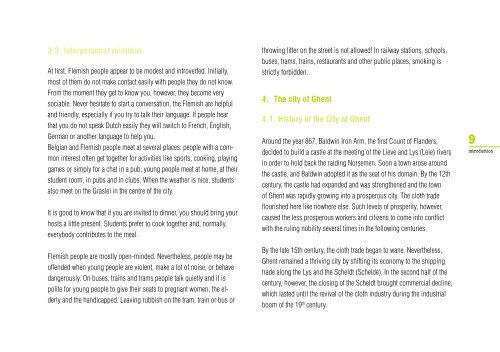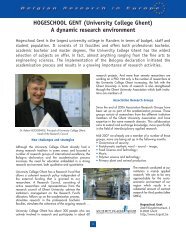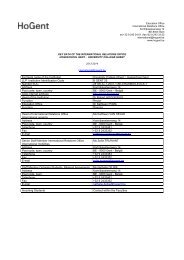Study Abroad? Destination Ghent! - Universiteit Gent
Study Abroad? Destination Ghent! - Universiteit Gent
Study Abroad? Destination Ghent! - Universiteit Gent
You also want an ePaper? Increase the reach of your titles
YUMPU automatically turns print PDFs into web optimized ePapers that Google loves.
3.3. Interpersonal relations<br />
At first, Flemish people appear to be modest and introverted. Initially,<br />
most of them do not make contact easily with people they do not know.<br />
From the moment they get to know you, however, they become very<br />
sociable. Never hesitate to start a conversation, the Flemish are helpful<br />
and friendly, especially if you try to talk their language. If people hear<br />
that you do not speak Dutch easily they will switch to French, English,<br />
German or another language to help you.<br />
Belgian and Flemish people meet at several places: people with a common<br />
interest often get together for activities like sports, cooking, playing<br />
games or simply for a chat in a pub; young people meet at home, at their<br />
student room, in pubs and in clubs. When the weather is nice, students<br />
also meet on the Graslei in the centre of the city.<br />
It is good to know that if you are invited to dinner, you should bring your<br />
hosts a little present. Students prefer to cook together and, normally,<br />
everybody contributes to the meal.<br />
Flemish people are mostly open-minded. Nevertheless, people may be<br />
offended when young people are violent, make a lot of noise, or behave<br />
dangerously. On buses, trains and trams people talk quietly and it is<br />
polite for young people to give their seats to pregnant women, the elderly<br />
and the handicapped. Leaving rubbish on the tram, train or bus or<br />
throwing litter on the street is not allowed! In railway stations, schools,<br />
buses, trams, trains, restaurants and other public places, smoking is<br />
strictly forbidden.<br />
4. The city of <strong>Ghent</strong><br />
4.1. History of the City of <strong>Ghent</strong><br />
Around the year 867, Baldwin Iron Arm, the first Count of Flanders,<br />
decided to build a castle at the meeting of the Lieve and Lys (Leie) rivers<br />
in order to hold back the raiding Norsemen. Soon a town arose around<br />
the castle, and Baldwin adopted it as the seat of his domain. By the 12th<br />
century, the castle had expanded and was strengthened and the town<br />
of <strong>Ghent</strong> was rapidly growing into a prosperous city. The cloth trade<br />
flourished here like nowhere else. Such levels of prosperity, however,<br />
caused the less prosperous workers and citizens to come into conflict<br />
with the ruling nobility several times in the following centuries.<br />
By the late 15th century, the cloth trade began to wane. Nevertheless,<br />
<strong>Ghent</strong> remained a thriving city by shifting its economy to the shipping<br />
trade along the Lys and the Scheldt (Schelde). In the second half of the<br />
century, however, the closing of the Scheldt brought commercial decline,<br />
which lasted until the revival of the cloth industry during the industrial<br />
boom of the 19 th century.<br />
9<br />
introduction






